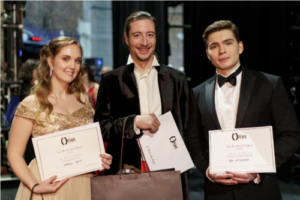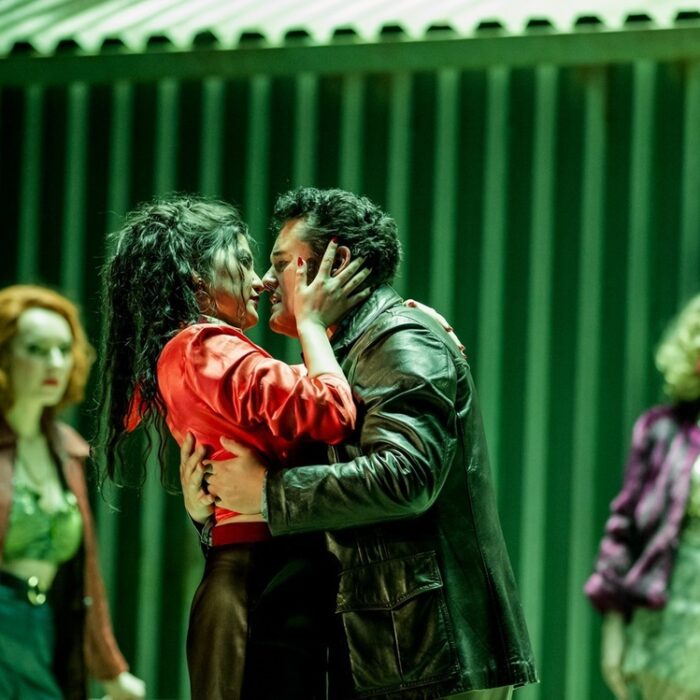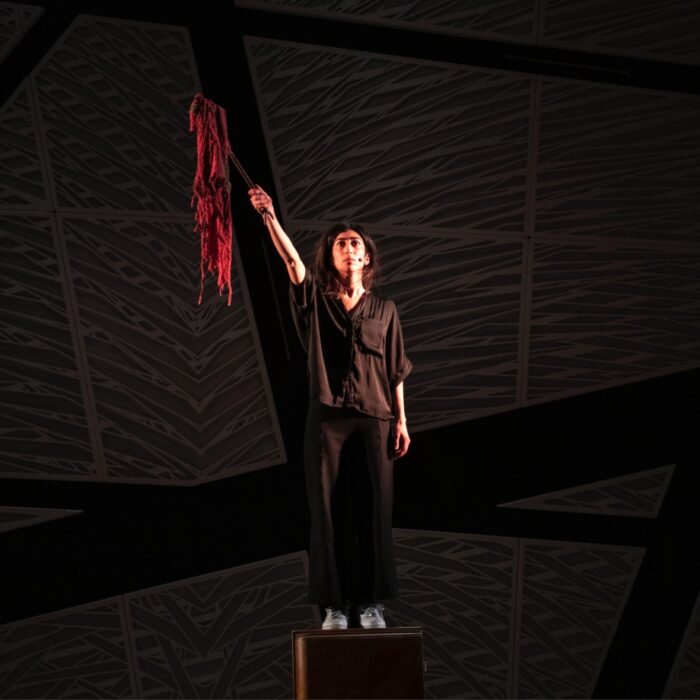
Paris Opera Competition 2019 Review
By William SharpeOn Friday night the house was full and the atmosphere was one of great anticipation for the sixth edition of the Paris Opera Competition at the Theatre des Champs-Elysées in Paris. The event has taken place here every year since its founding in 2010 by the late Pierre Vernes, who died in 2017. Each competition has been held as a tribute to Mr. Vernes’s memory ever since.
This year, 10 young singers from around the world came together to sing arias, duets, and a few ensemble pieces ranging from Mozart to Rimsky-Korsakov, with an emphasis on the bel canto repertoire of Donizetti and Bellini. Pierre-Michel Durand conducted the Orchestre Promethée which has been accompanying opera and ballet performances since its founding in 2004.
Creating Cohesion
But what differentiates this opera competition from other similar events is that the organizers tried to avoid the fragmented quality which arias taken out of dramatic context can sometimes have. Instead, they linked all the pieces to a loose story which connected the characters from the different operas into a coherent whole.
The program listed each composer with a title such as “King,” “Mother,” “Artist,” “Warrior,” “Lover,” each corresponding to a character who could fit into pretty much any opera. Each character was described by a five-word description such as, for the magician “maker of miracles and illusions.”
In order to create the illusion of a staged production, a sophisticated projection of peaceful or stormy landscape scenes was used for a backdrop to make the audience feel we were actually “at the opera.” Now that there were characters situated in a landscape, the evening’s commentator read out the story which was supposed to link the evening’s arias from beginning to end. However, the plot was hard to follow, so it’s quite possible none of the audience was actually able to figure out who was in love with whom, or how any character related to any other.
The Big Highlights
One of the highlights of the evening was French soprano Melissa Petit, who won third prize for her rendition of “Ah non credea – ah non giunge,” from Bellini’s “La Sonnambula.” In “Ah non credea” she was believable as the Swiss sleepwalker of the opera’s title, and she brought great musicality to her interpretation. For the upbeat aria that follows, in which a chorus joins her in the stage versions, the soprano polished off the rapid coloratura lines which express Amina’s sense of happiness with astonishing accuracy and audacity.
Joining forces with the American bass Alexander Hahn as the charlatan doctor Dulcamara was Chinese tenor Shan Huang in “Voglio dire” from Donizetti’s “L’Elisir d’Amore.” Huang was appropriately gullible as the besotted peasant Nemorino, in this humorous duet in which the doctor tries to sell his love potion to whoever is desperate enough to buy it.
With its quickly ascending scales alternating with Nemorino’s impassioned phrasing, this duet had the audience on the edge of our seats from beginning to end. The piece has ample opportunities for showing off the singer’s talent for vocal fireworks and proved to be a perfect vehicle for Huang’s skillful display of clear enunciation.
In the duet “Verranno a te sull’aure” from Donizetti’s “Lucia di Lammermoor,” the Costa Rican tenor David Astorga was a persuasive Edgardo, singing with great energy opposite Julia Sitkovestsky’s Lucia. Their voices blended well together, especially in the exciting conclusion in which they soar all the way up to a triumphant high B flat.
Throughout “Lunge da lei…o mio rimorso,” which opens Act two of Verdi’s “La Traviata,” Astorga sang with ease across the relatively wide vocal range needed for this role. The audience was ecstatic when he had finished this rousing cabaletta, which he delivered with poignant ardor, infusing it with a sense of vigor.
In “S uma neydot krasavitsa” from Rimsky-Korsakov’s historical Russian opera “The Tsar’s Bride,” the English baritone Benjamin Lewis brought a dark warmth to his rendition of Griaznoï’s aria, singing the fluid melodic line with urgency and a measured vibrato, holding steady above the turbulent orchestral passages which accompany the vocal line throughout.
There were three Mozart pieces sung this evening, including Susanna’s aria “Deh vieni non tardar” from “Le Nozze di Figaro.” The difficult task of opening the concert fell to Chilean soprano Yaritza Veliz who managed the challenge admirably, especially considering how many ways there are to sing Mozart’s music. The second Mozart piece, “Die Hölle Rache,” the Queen of the Night’s coloratura showpiece from “The Magic Flute,” was emphatically delivered by the Anglo-American soprano Julia Sitkovetsky.
The Winner
But ultimately it was the Russian baritone Ilya Kutyukhin who won first prize with “Ya vas Lyublyu,” from Tchaikovsky’s “Queen of Spades.” Yeletski’s passionate love song to his beloved Liza is one of the most eloquent arias the composer ever wrote for baritone. In this slow, pensive work, Kutyukhin lent the lyrical phrases a bold but fervent character uplifting Yeletskli’s plea to the woman he loves. When the melody reappeared, Durand guided the strings deftly into the heights, where they basked in the glory of Tchaikovsky’s majestic climax.
At the end of the aria, Kutyukhin held the long E flat with great control as it grew louder and then softer, while the audience held its breath along with him and wondered how many seconds he could stay on that note.
Working As A Team
Overall the musical choices for this evening were quite varied stylistically, ranging from Donizetti’s opera buffa to Francesco Cilea’s “Adriana Lecouvreur,” with arias in German, French, Italian, and Russian. Having both solos and ensemble pieces on the program meant that each singer could perform twice during the evening.
As a result, the artists were given a chance not only to demonstrate their proficiency in several languages, but also to show their capacity either to grab the audience’s attention during a solo or instead to blend their voice seamlessly into the musical texture of a group.
In addition, the solos were interspersed with duets, trios, and even two ensembles, including the famous “Chi mi frena,” more commonly known as the sextet from “Lucia di Lammermoor.” Bringing the musical part of the evening to its close, this short but compact work of bel canto bravura had something rewarding for each singer and highlighted everyone’s individual talents. In a theatrical gesture, all the singers were on stage forming a half circle, with the women creating a colorful display in their red, blue, and gold dresses.
A very sizable jury came out onstage, mostly composed of directors from European opera companies such as the Theatre de la Monnaie, and then each person for whom an award was named gave the prize personally to the singers.
When Ilya Kutyukhin appeared at the end to receive his first prize, he seemed overjoyed, standing in the spotlight soaking up every moment of his well-deserved applause. Each singer also received a black bag to take home, though it was never disclosed to the audience what the bag contained.
After the prizes had been awarded, it was time for the audience to vote for their preferred candidate. By sending the initial of a singer’s name to the phone number in the program, each audience member got to participate in choosing the winner. Not surprisingly, most of the spectators voted for Mr. Kutyukhin just as the jury had done.
Ultimately, however much the frame story did or didn’t make sense, the desire to link the disparate pieces to a narrative was a viable one, even if the audience came away having remembered more of the melodies they heard than the interwoven twists and turns of the elusive plot.


